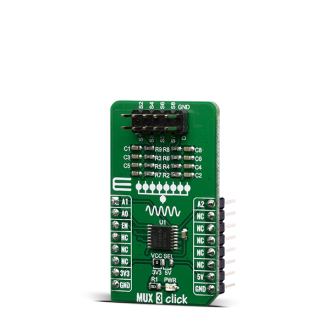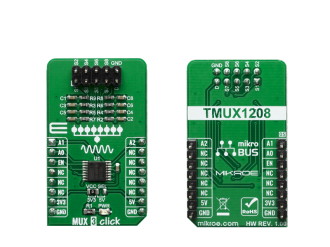
We strongly encourage users to use Package manager for sharing their code on Libstock website, because it boosts your efficiency and leaves the end user with no room for error. [more info]

Rating:
Author: MIKROE
Last Updated: 2020-01-21
Package Version: 1.0.0.0
mikroSDK Library: 1.0.0.0
Category: DAC
Downloaded: 3831 times
Not followed.
License: MIT license
The MUX 3 click is a Click board based around the TMUX1208 module, a 5-V Bidirectional 8:1, 1-Channel Multiplexer from Texas Instruments.
Do you want to subscribe in order to receive notifications regarding "MUX 3 click" changes.
Do you want to unsubscribe in order to stop receiving notifications regarding "MUX 3 click" changes.
Do you want to report abuse regarding "MUX 3 click".


Library Description
The library covers all the necessary functions to control MUX 3 click board.
Key functions:
void mux3_setChannel( uint8_t selectChannel ) - Set active MUX channel function.Examples description
The application is composed of three sections :
void applicationTask()
{
mikrobus_logWrite( "-------------------", _LOG_LINE );
mikrobus_logWrite( " Enable Channel: ", _LOG_LINE );
_displayLog( _MUX3_ENABLE_CHANNEL_S1 );
mux3_setChannel( _MUX3_ENABLE_CHANNEL_S1 );
Delay_1sec();
_displayLog( _MUX3_ENABLE_CHANNEL_S2 );
mux3_setChannel( _MUX3_ENABLE_CHANNEL_S2 );
Delay_1sec();
_displayLog( _MUX3_ENABLE_CHANNEL_S3 );
mux3_setChannel( _MUX3_ENABLE_CHANNEL_S3 );
Delay_1sec();
_displayLog( _MUX3_ENABLE_CHANNEL_S4 );
mux3_setChannel( _MUX3_ENABLE_CHANNEL_S4 );
Delay_1sec();
_displayLog( _MUX3_ENABLE_CHANNEL_S5 );
mux3_setChannel( _MUX3_ENABLE_CHANNEL_S5 );
Delay_1sec();
_displayLog( _MUX3_ENABLE_CHANNEL_S6 );
mux3_setChannel( _MUX3_ENABLE_CHANNEL_S6 );
Delay_1sec();
_displayLog( _MUX3_ENABLE_CHANNEL_S7 );
mux3_setChannel( _MUX3_ENABLE_CHANNEL_S7 );
Delay_1sec();
_displayLog( _MUX3_ENABLE_CHANNEL_S8 );
mux3_setChannel( _MUX3_ENABLE_CHANNEL_S8 );
Delay_1sec();
mikrobus_logWrite( "-------------------", _LOG_LINE );
mikrobus_logWrite( " Disable ", _LOG_LINE );
mikrobus_logWrite( " All Channels ", _LOG_LINE );
mux3_setChannel( _MUX3_DISABLE_ALL_CHANNELS );
Delay_1sec();
}
Additional Functions :
void _displayLog( uint8_t selCh )Display logs on Usart Terminal.Other mikroE Libraries used in the example:
Additional notes and informations
Depending on the development board you are using, you may need USB UART click, USB UART 2 click or RS232 click to connect to your PC, for development systems with no UART to USB interface available on the board. The terminal available in all MikroElektronika compilers, or any other terminal application of your choice, can be used to read the message.